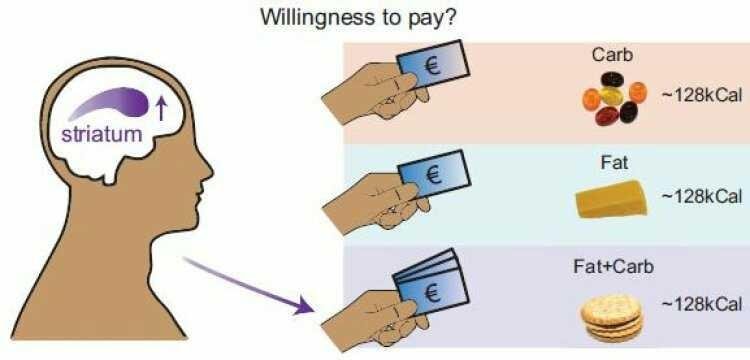
Researchers show that the reward center of the brain values foods high in both fat and carbohydrates -- i.e., many processed foods -- more than foods containing only fat or only carbs. A study of 206 adults, to appear June 14 in the journal Cell Metabolism, supports the idea that these kinds of foods hijack our body's inborn signals governing food consumption.
"The natural procedure that manages the relationship of nourishments with their wholesome esteem advanced to deliberately characterize the estimation of a sustenance so living beings can settle on versatile choices," says senior creator Dana Small, chief of Yale University's Modern Diet and Physiology Research Center. "For instance, a mouse ought not chance running away from any detectable hindrance and presenting itself to a predator if a nourishment gives little vitality."
"Shockingly, sustenances containing fats and sugars seem to flag their potential caloric burdens to the cerebrum through unmistakable instruments. Our members were exceptionally precise at evaluating calories from fat and extremely poor at assessing calories from sugar. Our examination demonstrates that when the two supplements are consolidated, the cerebrum appears to overestimate the fiery estimation of the nourishment," she says.
In work that could help clarify cerebrum body instruments hidden the hereditary inclination for heftiness, eating without yearning, and trouble losing or keeping off abundance weight, Small and partners in Germany, Switzerland, and Canada took a gander at the neural reaction to sustenance signs.
Guineas pigs experienced mind checks while being demonstrated photos of recognizable bites containing for the most part fat, generally sugar, and a blend of fat and carbs.
Apportioned a restricted measure of cash to offer on their first-decision nourishments, subjects were ready to pay more for sustenances that consolidated fat and sugars. Furthermore, the fat-carb combo lit up neural circuits in the reward focal point of the cerebrum in excess of a most loved nourishment, a conceivably sweeter or more vitality thick sustenance, or a bigger bit estimate.
Our seeker gatherer predecessors ate generally woody plants and creature meat, the analysts noted. "In nature, sustenances high in fat and starch are exceptionally uncommon and have a tendency to have fiber, which moderates digestion," Small says. "By differentiate, it is exceptionally normal for prepared sustenances to have high fat and high starch loads."
After the taming of plants and creatures and the improvement of grain and dairy generation around 12,000 years back, chances to devour fat and starches together expanded, however handled sustenances like doughnuts, which could contain 11 grams of fat and 17 grams of sugar, have just been around for a long time, not sufficiently long for us to advance another mind reaction to them.
Researchers trust our past involvement with the nutritive properties of sugars discharges dopamine in the cerebrum through an up 'til now obscure metabolic flag. These sorts of signs appear to help control what and the amount we eat.
The scientists hypothesize that the synchronous initiation of fat and sugar flagging pathways dispatches an impact that human physiology has not advanced to deal with. Predictable with this recommendation, rodents offered access to fat alone or sugar alone manage their aggregate day by day caloric admission and body weight. Be that as it may, given unlimited access to fat and starches, they rapidly put on weight.
Source
Plagiarism is the copying & pasting of others work without giving credit to the original author or artist. Plagiarized posts are considered spam.
Spam is discouraged by the community, and may result in action from the cheetah bot.
More information and tips on sharing content.
If you believe this comment is in error, please contact us in #disputes on Discord